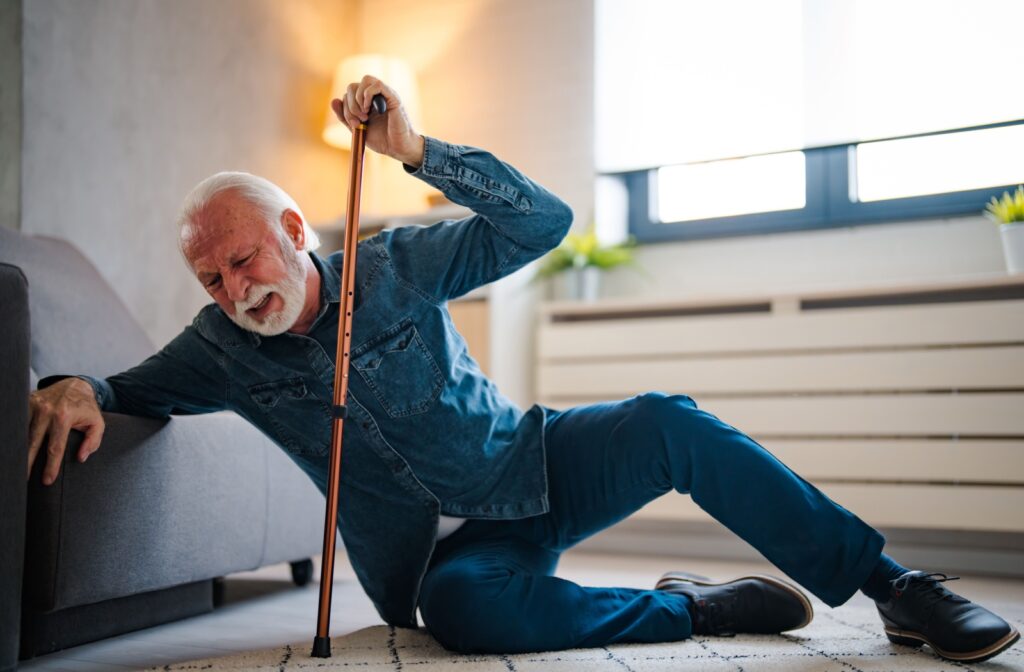Falls can be a concern for older adults and their families as they may lead to significant injuries that can impact independence and quality of life. As people age, physical changes and health conditions can increase the likelihood of falls, which may prompt the consideration of a senior living community. Fortunately, with the right measures and community, many falls are preventable. Here are 5 common ways you can prevent falls in older adults:
- Home safety
- Footwear
- Fitness
- Medications
- Health check-ups
The Importance of Safety in Older Adults
The safety of older adults is crucial as they move through different phases of life. Physical and mental changes brought on by aging can make people more vulnerable to mishaps and injury. Setting safety measures as a top priority helps protect older individuals’ freedom and well-being and enhances their quality of life. Handrails, removing tripping hazards, and having enough illumination are just a few simple yet effective ways to lower the risk of falls, which are one of the main causes of injuries among seniors.
Additionally, early detection of health issues and prevention of adverse medication reactions, such as dizziness, can be achieved by raising awareness of medication management and regular health check-ups. By creating a safe environment and implementing preventive measures, we can help protect older adults’ autonomy and dignity and allow them to lead happy, fulfilled lives.
Improve Home Safety
The home environment is a common location for falls due to hazards that may not initially be obvious. Making simple modifications can significantly enhance safety, such as:
- Remove tripping hazards: Make sure walking paths throughout the home are clear of obstacles such as loose rugs, cords, and clutter—secure rugs with double-sided tape or slip-resistant backings.
- Install grab bars and handrails: These are essential in high-risk areas such as bathrooms and stairs. Grab bars near the toilet and in the shower can prevent slips, while handrails on both sides of stairways can provide stability.
- Improve lighting: As vision decreases with age, enhancing lighting is crucial. Install brighter light bulbs where needed, particularly in stairways and narrow hallways. Consider nightlights in bedrooms, bathrooms, and hallways to prevent falls during the night.
- Make safe stairways: Make sure stairs are in good condition and have non-slip surfaces. Remove any objects from staircases and make sure carpeting is securely fastened.
Wear Proper Footwear
Footwear plays a critical role in preventing falls. Shoes should provide good support and have thin, non-slip soles. Avoid wearing slippers, high heels, or shoes with slick soles. Also, make sure that shoes fit properly and are in good condition, as ill-fitting shoes can significantly increase the risk of falling.
Maintain Physical Fitness
Physical activity can help prevent falls by strengthening muscles, improving balance, increasing coordination, and maintaining joint flexibility. Older adults should engage in activities that improve balance and coordination, such as:
- Tai chi: This martial art enhances balance and is often recommended to help prevent falls in older adults.
- Walking: Regular walking improves muscle strength and balance.
- Strength and balance exercises: Simple exercises like standing on one foot or walking heel to toe can also help maintain balance.
It’s important to consult a healthcare provider before starting any new exercise program, especially for individuals with existing health concerns.
Review Medications
Medications can increase the risk of falls, especially those that induce dizziness, drowsiness, or impair cognitive function. Older adults should have their medications reviewed regularly by a healthcare provider. The goal is to minimize side effects or interactions that may contribute to falls. This includes over-the-counter medications and dietary supplements.
Regular Vision & Hearing Checks
Impaired vision and hearing can greatly increase the risk of falling, making it harder to navigate obstacles and perceive environmental cues. Regular checks help make sure that glasses and hearing aids are updated as needed and functioning properly. Keeping these senses sharp can help prevent accidents.
Implementing Fall Prevention Strategies
Adopting these measures requires a proactive approach from older adults and their caregivers.
- Educate yourself and others: Awareness of fall prevention is crucial. Older adults and their families should be educated about the risks and prevention strategies.
- Home assessment: Consider a professional assessment of your home to identify and mitigate potential fall hazards.
- Community resources: Many communities offer programs and workshops on fall prevention that can provide valuable tips and strategies.
The Path Toward Safer Living
Falls should not be an inevitable part of aging. By taking proactive steps to minimize risk factors, older adults can maintain independence and live fulfilling lives. These 5 safety measures provide a foundation for creating a safer environment and lifestyle that can reduce the likelihood of falls. Remember, the best fall prevention plan is tailored to individual needs and continuously adapted as those needs change.
At Barton House Memory Care in Nashville, we offer many senior living options, including measures that provide safety for older adults. Book a tour to learn more about memory care.



